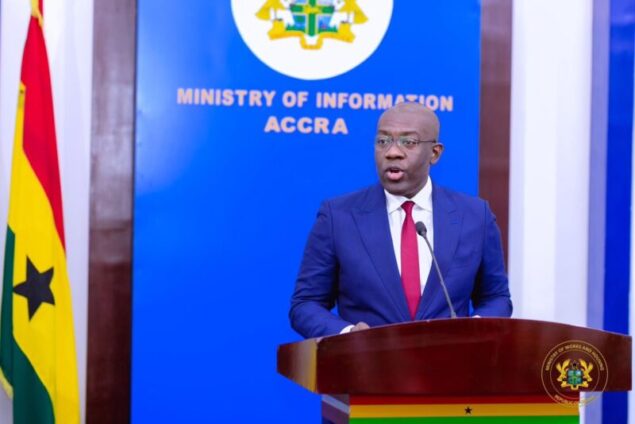The Ghana Infrastructure Investment Fund (GIIF) is set to play a pivotal role in promoting sustainable financing for housing projects across the country, according to Minister for Works and Housing, Kojo Oppong Nkrumah.
Speaking at a press briefing in Accra on Monday, September 30, the Minister stated government's commitment to addressing Ghana’s housing deficit, which is currently estimated at 1.8 million units.
He highlighted the need for innovative financing solutions to facilitate affordable housing projects, which are crucial in reducing the deficit.
To that end, the GIIF will partner with the Ministry of Works and Housing to develop sustainable financial frameworks that will drive housing development.
“The creation of the Ghana Infrastructure Investment Fund (GIIF) will help raise sustainable resources for nationwide housing projects, which is vital if we are to bridge the housing gap,” Mr Oppong Nkrumah said.
One of the primary strategies of the GIIF will be the establishment of a Public-Private Partnership (PPP) model to encourage private sector participation in housing provision.
This model will offer various incentives, such as land grants and tax breaks, to attract private developers.
In addition to the GIIF’s efforts, the Minister underscored the significance of the National Homeownership Fund (NHF), launched in 2018, to promote affordable housing.
The NHF has collaborated with commercial banks to implement the National Mortgage Schemes, which, during their pilot phase, facilitated the issuance of over 300 mortgages.
Mr Oppong Nkrumah also provided updates on ongoing housing projects.
The stalled Koforidua Affordable Housing Project will soon resume after being handed over to the State Housing Company Limited.
The aim is to accelerate construction while maintaining high standards.
In a separate development, he confirmed that negotiations are underway to hand over the Saglemi Housing Project to a private developer.
This move is expected to ensure the project's completion and the sale of its units without further government investment.
Lastly, the Minister highlighted the District Housing Programme, which is aimed at addressing the housing needs of public sector workers in rural areas, including those affected by the Akosombo Dam spillage.
Through partnerships with traditional authorities, this initiative seeks to secure unencumbered land, thus removing barriers that have long hindered real estate development in such areas.
Latest Stories
-
Feyenoord, Strasbourg eyeing move for Ghana midfielder Lawrence Agyekum
15 minutes -
Supreme Court unanimously strikes out suspended CJ’s supplementary affidavit
27 minutes -
Ten artists receive honourary awards from Otumfuo
33 minutes -
“Daddy, what have you done?”- Ntim Fordjour recounts his child’s reaction to NIB raid on his home
40 minutes -
Speaker announces reintroduction of anti-LGBTQ+ Bill in Parliament
1 hour -
Gyakie expresses excitement over Japan concert slated for July
1 hour -
Free SHS feeding issues: NPP has been vindicated, NDC scammed Ghanaians – Rev Ntim Fordjour
1 hour -
Ghana’s economic rebound real, but reforms must continue – Bank of Ghana
1 hour -
Otto Addo urges young Black Stars to seize Unity Cup opportunity
1 hour -
Kotoko to decide Karim Zito’s future at end of season – Sarfo Duku
1 hour -
‘The law is the law; and it’s being applied to her’ – Spio-Garbrah justifies actions against Torkornoo
2 hours -
Oaks FC secure Women’s Premier League promotion with a game to spare
2 hours -
The Chief Justice is undergoing a constitutional process – Hamza Suhuyini
2 hours -
Kojo PJay wins Comic Writer of the Year at 2025 Ghana Comedy Awards
2 hours -
Ghana’s tax system encourages evasion, enriches just a few – Prof Quartey warns
2 hours

